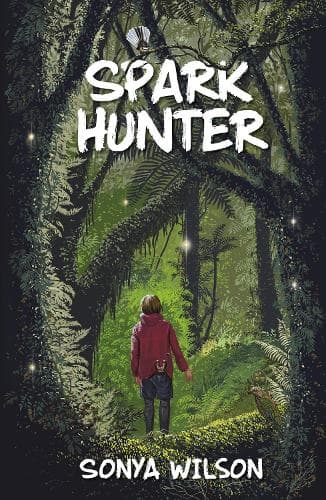Review: Spark Hunter
Reviewed by Sofia Glucina and Renee Liang
Mother and daughter Renee Liang and Sofia Glucina team up to review a novel that kept them entertained during the summer holidays, Spark Hunter.
Renee:
Spark Hunter is an original, fresh fantasy novel for young readers, lovingly crafted from author Sonya Wilson’s memories of a childhood spent roaming Fiordland. Her contemporary mythological world is populated by Sparks – the essences of native flora and fauna, both threatened by and dependent on the human world. Drawing on both Māori and European cultural markers, Wilson successfully navigates between inspiration and appropriation, creating a unique world that will captivate middle grade readers, as well as their parents.
Sofia:
At first, I found Spark Hunter boring. I would put off reading it a lot. But after chapter 9 and 10 I began getting into it. By chapter 15 I would stay up late reading.
Renee:
Ok, I’ll admit that I may have overcalled Sofia’s readiness to tackle this book! To be fair, it’s aimed at the 11-14 age group (she’s 9). Unlike Sofia, I was entranced by the early sections of the book where Wilson takes great care in world-building. The petty classroom feuds, awakenings of (platonic) relationships and the pain and confusion as self-identity emerges are crafted so beautifully. Wilson is a parent herself and her observations rang true for me as a parent.
The Sparks too (they hate being called fairies) are full of personality and once the world is established, the story takes off running. Wilson’s not afraid to put her characters in mortal danger - I can see why my adrenaline-junkie offspring got hooked at this point.
Sofia:
When I read over the parts where Nissa (the main character) was first lost, I felt scared and it was hard to put the book down without getting worried. The starts of the three main chapters with a section about old famous explorers hooked me.
Renee:
Wilson draws on historical records of early European explorers, museum archives, personal oral histories entrusted by local iwi and many other sources to ground the book in reality. The stories of real explorers, high-profile missing persons and unsolved mysteries thread through the fictional narrative, reminding us of Fiordland’s reputation as a beautiful but dangerous place.
Sofia:
The book made me think about how harshly we treat wildlife in New Zealand. The nature-filled book made me go outside and look at the trees several times. I would recommend it to someone who likes bush walks and nature.
Renee:
For me, the gentle environmental insights is what really elevates into a book that I would recommend for all readers. Woven into the narrative are reminders of our place in all of this. I’m so glad passages like this made my daughter take stock:
‘Everything in this forest is connected, whether we like it or not. The valleys determine the course of the rivers, the mountains affect the course of the clouds. The rain changes the rivers, the soil changes the trees. all of it is connected. Predator to prey. Us to you. You to us.’
Matched with this are observations of humanity, true of nearly every culture:
‘Inside there are all the persons who’ve gone before you. Your mother and your father, your grandparents, and all that they learnt in their lives and passed on to you. You also carry the lessons of others who aren’t your blood – the things schooled to you by your teachers, the stories passed on by your friends, the lessons from your collected history. You have all the ancestors of your species walking behind you.’
Sofia:
I would rate it 9 out of 10.
Renee:
I don’t like ratings, but I love that the book ends with a few loose ends untied, the fronds of new stories unfurling. I’m looking forward to more adventures in this world.
Reviewed by Sofia Glucina and Renee Liang
